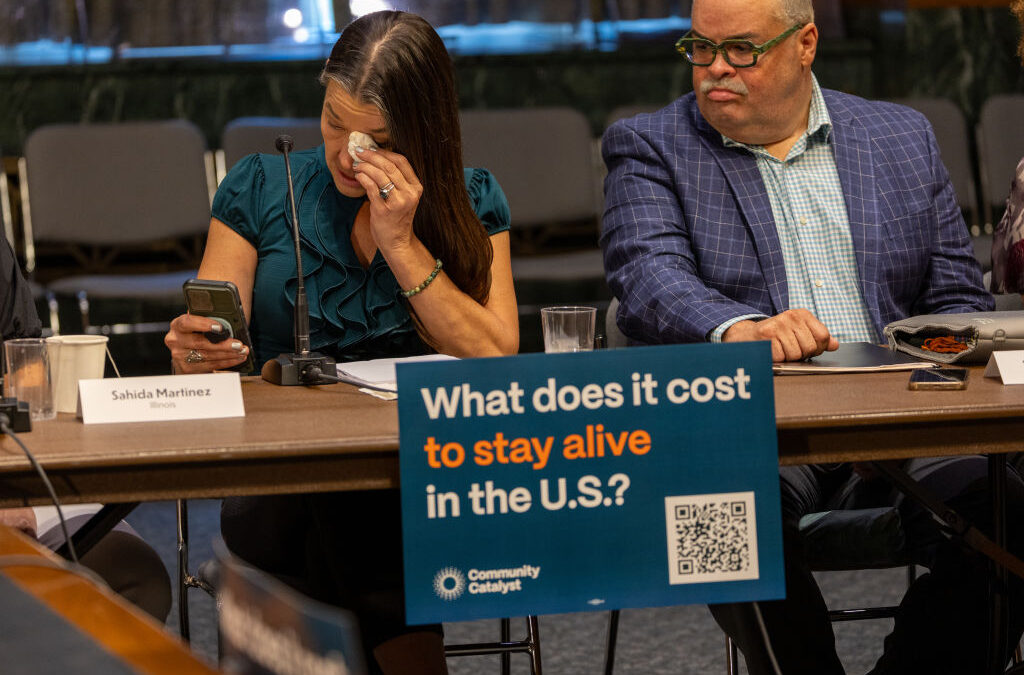
#image_title
#image_title
Eighty-eight percent of likely voters believe the government “should not have a say in personal matters like a person’s sexual orientation or gender identity,” 48% oppose anti-LGBTQ bills introduced by Republicans, and 55% oppose conservatives labeling teachers and LGBTQ people as “groomers.”
As lawmakers in Republican-led states like Wisconsin rush to introduce and pass laws to roll back the rights of LGBTQ children and adults, a new Courier Newsroom/Data for Progress poll suggests some of their efforts may be a step too far for voters.
Eighty-eight percent of likely voters believe the government “should not have a say in personal matters like a person’s sexual orientation or gender identity,” according to the poll, which surveyed 1,155 likely voters across the country between April 13 and 17.
That finding come at a time when state lawmakers across the country have proposed nearly 250 bills targeting LGBTQ issues, with about half of the bills regarding the rights of transgender individuals—the right’s latest bogeyman, even though trans individuals make up only 0.7% of the population. Some of the bills would restrict discussions about sexual orientation and LGBTQ history in classrooms while others would limit transgender people’s ability to play sports, use bathrooms that correspond with their gender identity, and receive gender-affirming health care.
When asked about whether they generally support or oppose the bills, 48% of voters, including clear majorities of Democrats and independents, said they opposed them. Only 42% of voters—including 63% of Republicans—said they supported such state legislation.
“This poll makes clear that people in Wisconsin rightfully oppose these harmful bills that interfere with people’s personal lives simply because of who they are,” said Megin McDonell, the executive director of LGBTQ advocacy group Fair Wisconsin.

In Wisconsin, the Republican-controlled legislature passed a bill that would allow parents to sue school districts and officials for using students’ chosen names or pronouns if the parents disagree with those names or pronouns. The bill was opposed by groups like the Human Rights Campaign and was vetoed by Gov. Tony Evers earlier this month. Wisconsin Republicans also tried to pass a bill banning transgender youth from receiving gender-affirming care, but failed to rally enough support.
“We’re grateful that none of these anti-LGBTQ+ bills were passed during our state’s legislative session—and that’s because our elected officials chose to focus on the real issues facing our state, rather than manufacturing a fake crisis out of kids playing sports with their friends or getting a quality education,” McDonell said.
That sort of legislation could become law next year, however, if an anti-LGBTQ Republican like Rebecca Kleefisch becomes governor.
“I am very nervous that the midterm elections will result in a shift of power that is more conservative,” said Barb Farrar, the executive director of the LGBT Center of Southeast Wisconsin. “If that happens, then Wisconsin could easily look more like Texas or Florida when it comes to passing anti-LGBTQ+ legislation.”
Farrar believes these bills are being used to try and win elections and are setting LGBTQ people “back decades.”
While voters broadly oppose these types of proposals, most have heard little about them. Only 28% of likely voters said they had heard “a lot” about these bills, with 72% saying they’d heard a “little” or “nothing at all.”
“These findings show that there’s still much work to be done to make sure people are aware of the harmful attacks happening against LGBTQ+ people all across the country,” McDonell said.
A plurality of voters (39%) also said they would be much less likely to vote for a candidate who would support laws that discriminate against LGBTQ individuals in schools and place restrictions on transgender individuals. Conversely, only 33% said they’d be more likely and 28% said it wouldn’t affect their choice.
Voters were even more turned off by the extreme policies and behavior from Republicans.
In recent months, some conservative politicians, activists, media pundits, and social media accounts have aggressively smeared teachers, LGBTQ people, Democrats, and Disney as being pedophiles and child “groomers”—a term used to describe someone who gets close to and builds trust with a child or young person with the intent of sexually abusing them.
These sorts of attacks have led to the harassment of teachers and school board members and raised fears that LGBTQ people could be forced back into the closet.
When asked whether “teachers and parents that support discussions about sexual orientation and gender identity in school are groomers,” 55% of voters rejected the label. Still, 29% of voters—including 45% of Republicans—agreed that the mere act of supporting discussions about sexual orientation and gender identity in school made someone a “groomer.”
Such rhetoric can have real consequences, according to Farrar.
“Parents and teachers who support and advocate for LGBTQ+ youth are so important,” she said. “Youth are the real victims in this situation and it is extremely difficult to have a healthy life experience with this kind of hateful and inaccurate rhetoric in places that are supposed to be safe like home and school.”

Respondents also overwhelmingly oppose Texas. Gov. Greg Abbott’s recent directive ordering the state’s child welfare agency to open child abuse investigations into parents of transgender children who seek gender-affirming care for their children. Such treatments consist of voluntary medical procedures or therapies that address the physical and mental health needs of transgender individuals.
Abbott’s order was temporarily blocked by a court last month, but could go back into effect this summer and may result in children being denied care or being separated from their parents.
When asked if they would support a similar directive from the governor of their state, 55% of voters—including 75% of Democrats and 61% of independents—said they would not. Only 34% of voters said they would support such an order, though 59% of Republicans took that position.

Even bills and policies that don’t pass can have a corrosive impact on LGBTQ individuals, however, as they watch politicians debate their very right to exist and be themselves.
A recent survey from the Trevor Project found that 85% of transgender or gender non-binary youth ages 13-24 and 66% of LGBTQ youth said their mental health had been negatively impacted by these legislative attacks.
Advocates also worry that this sort of anti-LGBTQ rhetoric and action can contribute to high rates of physical violence against them. LGBTQ people are nearly four times as likely than non-LGBTQ people to experience violent victimization, including rape, sexual assault, and aggravated or simple assault, according to a 2020 study by the Williams Institute at UCLA School of Law.
Despite the potential consequences of their anti-LGBTQ bills and rhetoric, Republicans appear to be moving forward with their agenda, with little regard for gay and transgender Americans.
“This dialogue is a constant reminder that transgender and nonbinary persons are not protected under the law like everyone else,” Farrar said. “You feel like an ‘other’ and a target rather than being equal.”
If you’re a member of LGBTQ community and you’re experiencing crisis, The Trevor Project, Association of Gay and Lesbian Psychiatrists, Trans Lifeline, the Prism Project, and the LGBT National Help Center may be helpful resources. The Wisconsin Department of Health Services also provides a list of resources, including information about several LGBT centers across the state which are open to the public.
Politics

Here’s what you need to know about medical debt in Wisconsin
Medical debt—a financial burden for tens of millions of Americans facing hundreds of billions of dollars in health care costs—affects everyone,...

Voucher schools are getting more funding than ever. What does that mean for Wisconsin public schools?
A massive funding increase for Wisconsin's voucher schools in 2023 has led to a growth in private schools getting taxpayer dollars—with a total...
Local News

The 8 most convincing UFO sightings in Wisconsin history
If you’ve ever seen something light up in the sky and wondered what it could be, there’s a chance it’s a UFO, especially if you’re in Wisconsin. The...

What’s the best budget-friendly destination in Wisconsin?
From the shores of Lake Michigan to the rustic beauty of the Northwoods, Wisconsin is teeming with unforgettable destinations where you can relax,...





